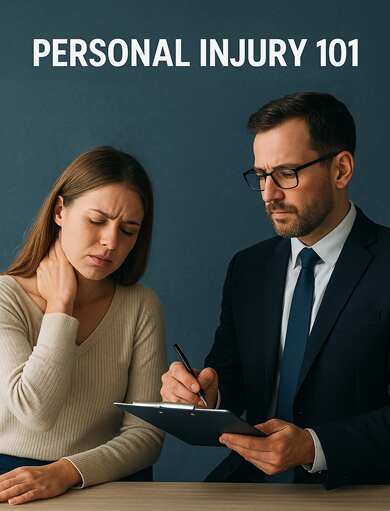Personal Injury 101: Case Types, the Claims Process, and What to Expect
Sustaining an injury changes everything for a while: routines wobble, bills pile up, and questions multiply. If you’re wondering whether to talk to a personal injury lawyer, what kind of cases they handle, and how a claim actually moves from statement to settlement, this primer will give you clear, no nonsense guidance.

What counts as a personal injury case?
Personal injury covers situations where someone’s negligence or wrongdoing causes physical or emotional harm. Common examples pop up all the time: car wrecks with whiplash and broken bones, motorcycle crashes that leave riders seriously hurt, truck collisions with catastrophic damage, slip and fall incidents on poorly maintained premises, and workplace injuries where liability may be shared. Beyond those, there are product liability claims, medical malpractice, and sometimes dog bite matters. If your life was disrupted by another party’s actions, you probably have a claim worth evaluating.
How the claims process usually unfolds
The path isn’t mystical, but it does have stages you should know.
- Initial consult and investigation: A good attorney listens, reviews medical records and police reports, and looks for witnesses and evidence. Many people start by searching for a personal injury lawyer to find local counsel who understands regional rules.
- Demand and negotiation: Once liability and damages are reasonably established, your lawyer sends a demand letter to the insurer outlining injuries, treatment, lost wages, and a monetary ask. Expect pushback; insurers aim to minimize payouts. Skilled negotiators, especially experienced personal injury attorneys, press for fair offers.
- Filing suit: If negotiations stall, the attorney files a lawsuit. That triggers formal discovery: depositions, document exchange, interrogatories. It’s slower, but it also raises the stakes.
- Mediation or trial: Many cases settle at mediation before trial, but some proceed to court for a judge or jury decision. Trials are unpredictable, yet they often spur settlements because both sides weigh risk.
What damages can you recover?
Compensation may cover medical expenses, ongoing care, lost income, diminished earning capacity, pain and suffering, and sometimes punitive damages when conduct was egregious. The exact types vary by jurisdiction and the facts of your case.
Do I need a lawyer?
Not every claim requires counsel, but when injuries are significant or liability is disputed, a lawyer’s value becomes stark. Attorneys translate medical evidence into dollar figures, handle insurance tactics, and protect procedural deadlines. If you’re hunting for the “best personal injury attorney,” prioritize experience with cases like yours: automobile accident, motorcycle injury, slip and fall, or workplace harm.
Fees and affordability
Most personal injury firms operate on contingency: they collect a percentage of the recovery, no fee unless you win. This arrangement, sometimes called “no win no fee”, aligns incentives; lawyers invest time because they only get paid if you do. Always confirm the fee structure up front and get it in writing. Fee rates (commonly 25 to 40 percent).
What to expect emotionally and practically
Expect paperwork and patience. Healing and legal timelines don’t run at the same pace. You’ll need to document follow up care, keep receipts for expenses, and be candid with your attorney about prior injuries or insurance coverage. Communication matters; a responsive lawyer eases stress, especially when you’re searching for near “injury attorneys” and comparing options.
How cases are valued, practical math you can use
Damages break into economic (medical bills, lost wages, future care) and non-economic (pain and suffering, loss of enjoyment). Common valuation approaches include:
- Straight economic total = medical bills + lost income + future costs.
- Multiplier method for pain and suffering = economic damages times a multiplier (often 1.5 to 5) based on severity and permanence.
- Per diem method = assign a daily rate for pain and suffering and multiply by days affected.
Experienced auto accident lawyers will build both objective cost spreadsheets and persuasive narratives to justify an appropriate multiplier. Don’t accept a quick lowball without a clear breakdown.
Red flags when choosing counsel
Beware of grandiose promises or firms that pressure you to sign immediately. A reputable attorney explains likely outcomes, potential pitfalls, and plausible settlement ranges. Look for transparent fee agreements, local courtroom experience, and client testimonials that feel authentic.
Final thought
A personal injury claim is about more than money; it’s about restoration: covering costs, compensating lost time, and asserting accountability. Whether you were in an auto accident, injured at work, or slipped and fell, an informed attorney can turn confusion into strategy. Start by collecting your medical records and photos, then consult a local personal injury lawyer to map the best route forward.
If you want a quick next step, search for an experienced personal injury attorney in your area, read a few client reviews, and book a free consult. You’ll know fast whether the case has merit and what the likely path might be.